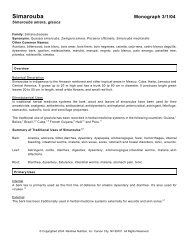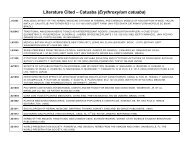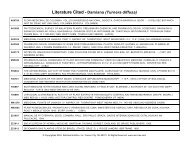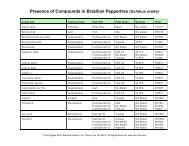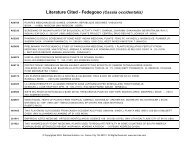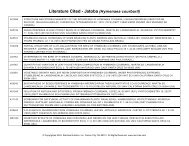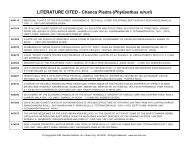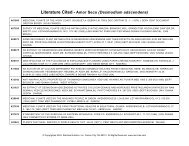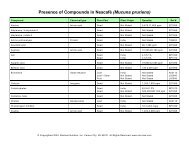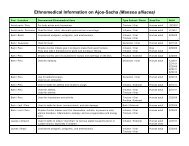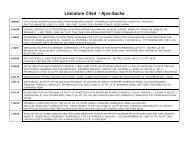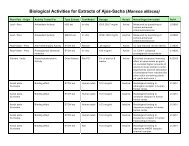Organ Specific Guide - Raintree Nutrition, Inc
Organ Specific Guide - Raintree Nutrition, Inc
Organ Specific Guide - Raintree Nutrition, Inc
Create successful ePaper yourself
Turn your PDF publications into a flip-book with our unique Google optimized e-Paper software.
AMAZON BLOOD SUPPORT<br />
Description: A combination of rainforest medicinal plants which have been traditionally used to support<br />
healthy blood cholesterol parameters.<br />
Traditional uses by organ or system: Endocrine: To balance and maintain healthy blood cholesterol<br />
levels and for hypercholesterolemia.<br />
Ingredients: A proprietary blend of artichoke (Cynara scolymus), bitter melon (Momordica charantia),<br />
yerba mate (Ilex paraguayensis), suma (Pfaffia paniculata), vassourinha (Scoparia dulcis), pata de vaca<br />
(Bauhinia forficata), and sarsaparilla (Smilax officinalis).<br />
Suggested Use: Take 2-3 capsules twice daily.<br />
Contraindications:<br />
• Several of these ingredients contain plant saponins and/or phytosterols which may have an estrogenic<br />
effect. As such this formula is contraindicated in women with hormone-positive cancers.<br />
• This formula contains yerba mate which contains naturally-occurring caffeine. Those allergic to or<br />
sensitive to caffeine should not use this formula.<br />
Drug Interactions: May potentiate anti-cholesterol drugs.<br />
Other Practitioner Observations and Possible Precautions:<br />
• Those taking statin or cholesterol-lowering drugs need to be more closely monitored on this formula as<br />
medications may need adjusting.<br />
• Two ingredients in the formula have a mild hypoglycemic effect. Those with hypoglycemia should be<br />
monitored more closely for this possible effect.<br />
Synopsis of research: (Please the online Tropical Plant Database for all cited research.)<br />
• A double-blind, randomized, placebo-controlled study was published in 2000 on artichoke leaf extract.<br />
For six weeks, 143 patients with high cholesterol were given artichoke; at the end of the test, results<br />
showed a decrease of 10%-15% in total cholesterol, low density lipoprotein (LDL), and ratio of LDL to<br />
HDL cholesterol. Scientists now report that the cholesterol-lowering effect of artichoke can be attributed<br />
to chemicals other than just cynarin, including several newly discovered ones.<br />
• To date, close to 100 in vivo studies have demonstrated the hypoglycemic and anticholesterolemic<br />
effects of bitter melon. This plant has shown the ability to enhance cells' uptake of glucose, to promote<br />
insulin release, and to potentiate the effect of insulin. In other in vivo studies, bitter melon has been<br />
shown to reduce total cholesterol. In one study, elevated cholesterol and triglyceride levels in diabetic<br />
rats were returned to normal after 10 weeks of treatment.<br />
• Yerba mate has significant antioxidant activity, demonstrated in numerous studies. An infusion of the leaf<br />
has been demonstrated to inhibit lipid peroxidation—particularly LDL oxidation. Another in vitro study has<br />
shown yerba mate to inhibit the formation of advanced glycation end products (AGEs), with an effect<br />
comparable to that of two pharmaceutical AGE-inhibitor drugs.<br />
• Suma root has a very high saponin content (up to 11%). In phytochemistry, plant saponins are well<br />
known to have a wide spectrum of activities including lowering blood cholesterol, inhibiting cancer cell<br />
growth, and acting as antifungal and antibacterial agents. Phytochemists report that saponins can act<br />
by binding with bile acids and cholesterol. It is thought that these chemicals "clean" or purge these fatty<br />
compounds from the body (thus lowering blood cholesterol levels).<br />
• Vassourinha contains several active constituents which are documented with anticholesterolemic,<br />
hypotensive and hypoglycemic effects.<br />
• In 2004, a research group reported that pata de vaca lowered blood sugar in rats and also reduced triglycerides,<br />
total cholesterol and HDL-cholesterol levels in diabetic rats stating, "These results suggest<br />
the validity of the clinical use of B. forficata [pata de vaca] in the treatment of Diabetes mellitus type II."<br />
• The majority of sarsaparilla's pharmacological properties and actions have been attributed to novel and<br />
known steroids and saponins. The saponins have been reported to facilitate the body's absorption of<br />
other drugs and phytochemicals, which accounts for its history of use in herbal formulas as an agent for<br />
bioavailability and to enhance the power and effect of other herbs.



